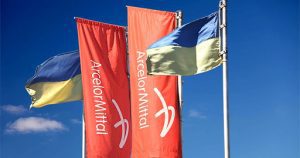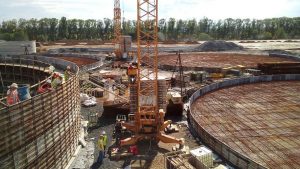
PJSC ArcelorMittal Kryvyi Rih (Dnipropetrovsk region) in 2020 reduced investments in labor protection by 24.4% compared to the previous year, to UAH 380.7 million from UAH 503.4 million.
According to a press release from the enterprise, the company continues to invest in improving working conditions, providing workers with special clothing and footwear, personal protective equipment, as well as implementing measures to reduce injuries and increase the level of industrial safety.
At the same time, it is specified that last year the company registered 34 lost time injuries among its own personnel and contractors. Of these – three fatal accidents (two with the plant employees and one with an employee of the contractor). The overall accident rate in the plant for 2020 (including subsidiaries in Ukraine) was 0.61. The injuries were predominantly associated with the falls of the victims. In the second place is the exposure of workers to high temperatures, as well as injuries as a result of the action of moving, flying and rotating parts, equipment parts and objects.
Most of the injuries occurred for organizational reasons – violation of labor and production discipline. Some 38% of injured workers are not new to production, their work experience in the profession is more than 10 years. The cause of injury is in performing habitual actions with reduced attention during work. Some 24% of injuries occur among young workers with up to 1 year of work experience in production.
From September 22 to September 25, 2020, TMS certification organization conducted an audit of the plant’s labor protection management system for compliance with the requirements of international standard ISO 45001: 018, as a result of which the company received a certificate of conformity.

The energy company DTEK is creating an investment hub for the new Ukrainian energy sector in London, which is scheduled to start operating at the end of the first half of 2021, the press service of DTEK said on Friday, January 8.
“We are creating a hub to attract investments in new energy projects in Ukraine. First of all, this concerns renewable energy sources, energy storage systems and energy projects using hydrogen. Together with the increase in gas production and the development of networks, these areas are identified as priorities in our new strategy,” CEO of DTEK Maksym Tymchenko said, whose words are quoted in the release.
According to him, the specially created company DTEK International Ltd. will carry out operational activities to attract investment to Ukraine in the UK.
The message also indicates that the new DTEK office will be located in the City of London and will be aimed at working both with investors wishing to invest in Ukraine and with Ukrainian entrepreneurs developing energy projects.
As reported, according to the new strategy of DTEK 2030, the company undertook, in particular, commitments to achieve compliance with European legislation on harmful emissions by 2025 and become carbon neutral by 2040, will continue the practice of introducing a wireless Wi-Fi network at its coal mining assets, intends to expand power grid assets in Ukraine and the EU countries and its activity in green energy, including new renewable energy projects outside Ukraine, as well as trading on the markets of EU countries.
DTEK, HUB, INVESTMENT, UK

The Verkhovna Rada of Ukraine adopted bill No. 3761 with amendments to the Tax Code with benefits for projects with significant investments, as well as bill No. 3262, with amendments to the Customs Code from the package of bills on investment raising.
According to a correspondent of Interfax-Ukraine, bill No. 3261 was supported by 273 MPs and bill No. 3262 was supported by 262 MPs, with the required 226 votes.
The bills provide tax incentives for investors who implement projects with significant investments, as well as exempt from import duties on equipment for such projects.
In addition, the bill amending the Tax Code proposes to exempt equipment from VAT for 2021-2035, which is imported for the implementation of a project with significant investments, and also provides for income tax benefits.
Deputy Head of the President’s Office Yulia Kovaliv said that the bills are intended to strengthen Ukraine’s position in investment raising and creating new jobs in the package with the previously adopted bill No. 3760 on investment.

Myronivsky Hliboproduct (MHP), one of the largest agricultural holdings in Ukraine, is working on a carbon dioxide plant project, deputy chairman of the board Oleksandr Dombrovsky has said when signing a memorandum of partnership between the agricultural holding and Organic Ukraine.
“This is an innovative project, I can’t tell you much. We are now doing a very professional feasibility study, considering various options. Today it is too early to say that we are ready for this project. We are working on it,” he said.
Dombrovsky clarified that the plant is being designed both for the needs of MHP itself, and for the domestic market and export. According to him, today about 70% of carbonic acid in the domestic market is imported, mainly from Poland and Hungary.
He also said that MHP, which has already built two of the world’s largest biogas complexes for processing poultry manure, has another ready-made similar project and a permit for its construction.
“But we are thinking to start or not to start. And if to start, then when, given that the “green” industry in Ukraine has not been paid money at all for six months,” Dombrovsky explained.
He stressed that investments in biogas are significantly higher than in solar energy, and range from EUR3 million to EUR3.5 million per 1 MWh of capacity.
The expert noted that the agricultural holding is also working on other innovative projects, in particular, on “green” hydrogen.
BIOGAS, CARBONIC ACID, GREEN POWER, INDUSTRY, INVESTMENT, MHP

The National Bank of Ukraine (NBU) has revised approaches to calculating foreign direct investment (FDI), in particular, reevaluated the cost of FDI, which was previously calculated in foreign currency, to the hryvnia equivalent, the NBU press service said on Friday.
According to the report, the National Bank also began to consider reserves, additional capital, retained earnings and damage to the application to the charter capital of enterprises with FDI.
In addition, the regulator changed the approach to accounting for negative capital indicators in companies with FDI, in particular for such enterprises, the NBU began to use zero values in calculations.
As a result of the new calculations, FDI in Ukraine in 2019 increased by 5.1%, to $51.4 billion, and investment from Ukraine decreased 56.5%, to $3.5 billion.
“After the recalculation, FDI volumes generally increased. For example, in 2019, FDI volumes increased by about $2 billion only due to significant profits while the business environment was favorable. Last year’s appreciation of the exchange rate also contributed to an increase in the FDI volumes in U.S. dollar terms,” Director of the Statistics and Reporting Department Yuriy Polovnev said.
He said that the recalculation of FDI will not affect the balance of payments.